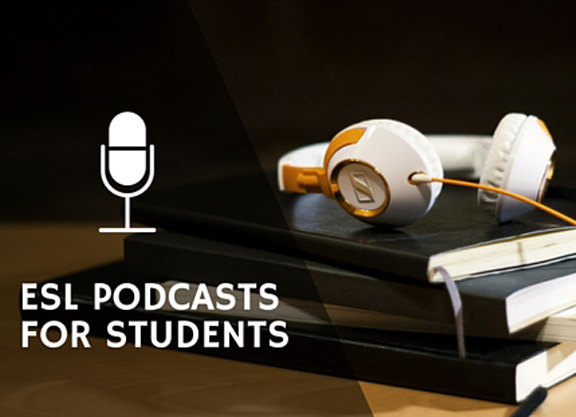Many host parents will come to find, perhaps after an initial adjustment to American culture, that Gphomestay international students are extremely dedicated to learning and perfecting their English language skills.
Though most students will have English Language instruction at home, students choose to live in a homestay to further immerse themselves in English-speaking environments. Merely interacting with your student on a daily basis is enough to help your student adjust to speaking English comfortably. But in this day and age, students have so many additional resources available to them online to learn English too.
Here are some of my favorite podcasts, and the benefits of each. Share these with your students if you see them struggling with English at home, or as a supplement to their already great English skills.
1. Elemental English
Bridging the gap between textbook language and everyday speech

Elemental English is a website, podcast, and YouTube channel focused on teaching naturally spoken American English to its users. The site has specific lessons geared towards Chinese and Korean speakers as well as general lessons for all ESL students. The podcast offers a variety of audio lessons delivered in a slow, easy-to-follow voice while addressing the nuances of spoken American English. It seeks to bridge the gap between textbook language and everyday speech. The site has a range of grammar, pronunciation, listening and cultural lessons for all learning levels. The podcast is available through iTunes.
2. OMG! Meiyu
Upbeat, fun videos on American slang and idioms in Chinese

OMG! Meiyu isn’t just another YouTube channel, it’s a cultural phenomenon. Originally part of Voice of America’s program offerings, Jessica Beinecke, whose Chinese name is Bai Jie, began OMG! Meiyu in 2011. Her upbeat, fun videos feature explanations of American slang and idioms in Chinese with bilingual subtitles. She delivers her mini-lessons with energy, charm and a smile and has become wildly famous in China and around the world. She’s now branched out and offers videos and materials on two websites, one delivering content to English language learners and the other aimed at English speakers learning Mandarin.
3. All Ears English
Making oneself understood, and understanding others, in a variety of cultural contexts

The tag line of this podcast and website is “connection not perfection.” Their lessons put emphasis on making oneself understood, and understanding others, in a variety of cultural contexts. The hosts of the podcast, two American ESL teachers, deliver the material with energy and enthusiasm. The audio podcast is recommended for more advanced students, as the pace is closer to that of a native speaker. They work to deliver material not heard in the typical ESL classroom. The podcast is available in iTunes or other podcasting devices.
4. BBC 6-Minute English and The English We Speak:
Learning British English from the BBC

These two podcasts are part of the BBC Learning English family. They offer learners a variety of quick and easily digestible lessons on spoken British English. “The English We Speak” is a 2-minute look at English idioms, what they mean and how to use them. “6-minute English” tends to be longer and involve dialogue and grammar discussion. These are perfect for students interested in British English or studying in the UK, or anyone who wants to improve their listening and speaking fluency.
5. English as a Second Language
Hearing and speaking phrases slowly and deliberately

English as a Second Language is a podcast produced out of Los Angeles by the Center for Educational Development and has lessons for all language levels. The episodes alternate between dialogue analysis and discussion topics mixed with listener questions and comments. The dialogues in particular are a great resource for students at every level. The host starts with a slowed down version of the dialogue and then breaks down new words and phrases, giving detailed explanations about how and when to use them. Once the meaning is clear, he plays the dialogue a second time at normal speed. Listeners are able to check their own understanding and comprehension. With almost 2,000 episodes to choose from, this podcast is a staple for any English language learner.




